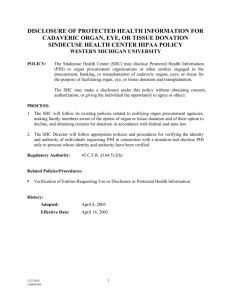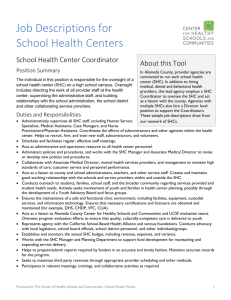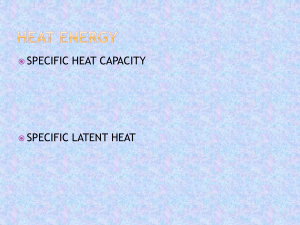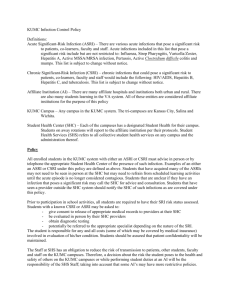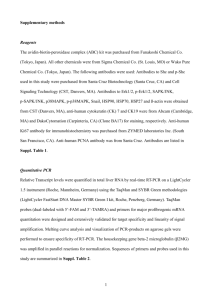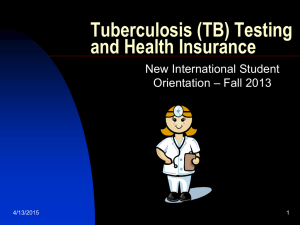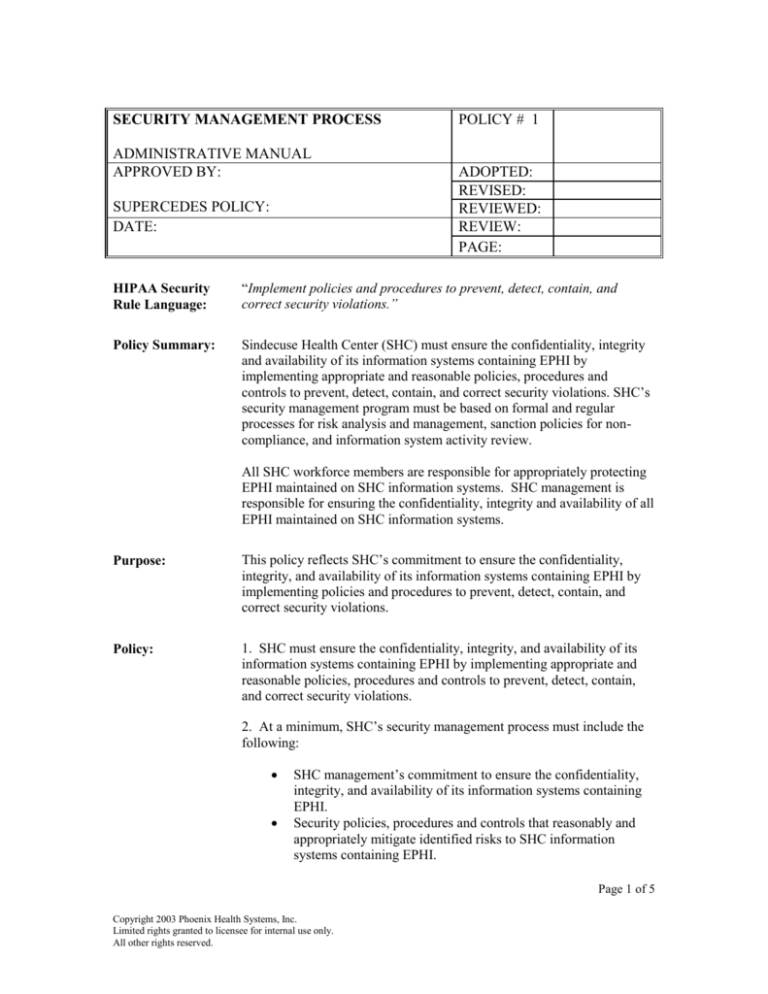
SECURITY MANAGEMENT PROCESS
ADMINISTRATIVE MANUAL
APPROVED BY:
SUPERCEDES POLICY:
DATE:
POLICY # 1
ADOPTED:
REVISED:
REVIEWED:
REVIEW:
PAGE:
HIPAA Security
Rule Language:
“Implement policies and procedures to prevent, detect, contain, and
correct security violations.”
Policy Summary:
Sindecuse Health Center (SHC) must ensure the confidentiality, integrity
and availability of its information systems containing EPHI by
implementing appropriate and reasonable policies, procedures and
controls to prevent, detect, contain, and correct security violations. SHC’s
security management program must be based on formal and regular
processes for risk analysis and management, sanction policies for noncompliance, and information system activity review.
All SHC workforce members are responsible for appropriately protecting
EPHI maintained on SHC information systems. SHC management is
responsible for ensuring the confidentiality, integrity and availability of all
EPHI maintained on SHC information systems.
Purpose:
This policy reflects SHC’s commitment to ensure the confidentiality,
integrity, and availability of its information systems containing EPHI by
implementing policies and procedures to prevent, detect, contain, and
correct security violations.
Policy:
1. SHC must ensure the confidentiality, integrity, and availability of its
information systems containing EPHI by implementing appropriate and
reasonable policies, procedures and controls to prevent, detect, contain,
and correct security violations.
2. At a minimum, SHC’s security management process must include the
following:
SHC management’s commitment to ensure the confidentiality,
integrity, and availability of its information systems containing
EPHI.
Security policies, procedures and controls that reasonably and
appropriately mitigate identified risks to SHC information
systems containing EPHI.
Page 1 of 5
Copyright 2003 Phoenix Health Systems, Inc.
Limited rights granted to licensee for internal use only.
All other rights reserved.
SECURITY MANAGEMENT PROCESS
Regular review and revision, as necessary, of such security
policies, procedures and controls.
Regular training and awareness of SHC workforce members on
such security policies, procedures and controls.
3. SHC’s security management process must be based on formal and
regular risk analysis and management.
4. All SHC workforce members are responsible for appropriately
protecting EPHI contained on SHC information systems from
unauthorized access, modification, destruction and disclosure.
5. SHC management is responsible for ensuring the confidentiality,
integrity and availability of EPHI contained on SHC information systems
by implementing appropriate and reasonable security policies, procedures
and controls.
6. SHC data stewards are workforce members who create EPHI stored on
SHC information systems. The security management responsibilities of
SHC data stewards include but are not limited to:
Understanding the data for which they are responsible and
ensuring its confidentiality, integrity and availability.
Specifying and approving the use of security policies, procedures
and controls for the EPHI for which they are responsible.
Authorizing appropriate access to the EPHI for which they are
responsible to SHC workforce members.
Promptly reporting security violations and risks to the EPHI for
which they are responsible.
Assisting in investigations of security violations to the with
respect to the EPHI for which they are responsible.
Promoting SHC security training and awareness for all
workforce members.
7. SHC data custodians are providers of data processing services such as
application software, networks, operating systems, etc. The security
management responsibilities of SHC data custodians include but are not
limited to:
Administering security policies, procedures and controls as
specified by SHC’s data stewards, information security office
and appropriate management.
Coordinating the identification of SHC data processing assets.
Ensuring the effective use of data backup procedures for SHC
information systems containing EPHI.
Ensuring the confidentiality, integrity and availability of SHC’s
data network and information system operating systems.
Maintaining the confidentiality of all data processed, handled, or
Page 2 of 5
Copyright 2003 Phoenix Health Systems, Inc.
Limited rights granted to licensee for internal use only.
All other rights reserved.
SECURITY MANAGEMENT PROCESS
seen in the performance of data custodian duties.
Ensuring there is appropriate supervision of workforce members
performing maintenance activities on SHC information systems
containing EPHI.
8. SHC data users are users of SHC data processing services such as
application software and data, networks, operating systems, etc. The
security management responsibilities of SHC data users, include but are
not limited to:
Using SHC data processing resources only for intended
purposes.
Promoting awareness and use of SHC security controls.
Complying with all appropriate SHC security policies,
procedures and standards.
Promptly reporting security violations.
Attending appropriate SHC security training and awareness.
9. The security management responsibilities of SHC’s administration
include but are not limited to:
Approving SHC information security policies.
Approving and supporting SHC security awareness and training
programs.
Approving and supporting the SHC information security
sanction policy.
10. The SHC is responsible for establishing policies that require
appropriate clearance and training before a workforce member is allowed
access to SHC information systems containing EPHI.
11. As defined in SHC’s Risk Analysis policy, SHC must regularly
identify, define and prioritize risks to the confidentiality, integrity, and
availability of its information systems containing EPHI.
12. As defined in SHC’s Risk Management policy, SHC must
implement security measures that reduce the risks to its information
systems containing EPHI to reasonable and appropriate levels.
13. As defined in SHC’s Sanction policy, SHC must apply appropriate
sanctions against workforce members who fail to comply with its security
policies and procedures.
14. As defined in SHC’s Information System Activity Review policy,
SHC must regularly review records of activity on information systems
containing EPHI.
Page 3 of 5
Copyright 2003 Phoenix Health Systems, Inc.
Limited rights granted to licensee for internal use only.
All other rights reserved.
SECURITY MANAGEMENT PROCESS
Scope/Applicability: This policy is applicable to all departments that use or disclose electronic
protected health information for any purposes.
This policy’s scope includes all electronic protected health information, as
described in Definitions below.
Regulatory
Category;
Administrative Safeguards
Regulatory Type:
Standard
Regulatory
Reference:
45 CFR 164.308(a)(1)(i)
Definitions:
Electronic protected health information means individually identifiable
health information that is:
Transmitted by electronic media
Maintained in electronic media
Electronic media means:
(1) Electronic storage media including memory devices in computers
(hard drives) and any removable/transportable digital memory medium,
such as magnetic tape or disk, optical disk, or digital memory card; or
(2) Transmission media used to exchange information already in
electronic storage media. Transmission media include, for example, the
internet (wide-open), extranet (using internet technology to link a business
with information accessible only to collaborating parties), leased lines,
dial-up lines, private networks, and the physical movement of
removable/transportable electronic storage media. Certain transmissions,
including of paper, via facsimile, and of voice, via telephone, are not
considered to be transmissions via electronic media, because the
information being exchanged did not exist in electronic form before the
transmission.
Information system means an interconnected set of information resources
under the same direct management control that shares common
functionality. A system normally includes hardware, software,
information, data, applications, communications, and people.
Workforce member means employees, volunteers, and other persons
whose conduct, in the performance of work for a covered entity, is under
the direct control of such entity, whether or not they are paid by the
covered entity. This includes full and part time employees, affiliates,
associates, students, volunteers, and staff from third party entities who
Page 4 of 5
Copyright 2003 Phoenix Health Systems, Inc.
Limited rights granted to licensee for internal use only.
All other rights reserved.
SECURITY MANAGEMENT PROCESS
provide service to the covered entity.
Availability means the property that data or information is accessible and
useable upon demand by an authorized person.
Confidentiality means the property that data or information is not made
available or disclosed to unauthorized persons or processes.
Integrity means the property that data or information have not been altered
or destroyed in an unauthorized manner.
Risk means the likelihood that a specific threat will exploit a certain
vulnerability, and the resulting impact of that event.
Security measures means security policies, procedures, standards and
controls.
Data custodian refers to those who conduct data processing services for
the organization’s software applications, data, networks, operating
systems, etc.
Data steward refers to individuals responsible for the creation of the data
used or stored in organizational computer systems.
Responsible
Department:
SHC
Policy Authority/
Enforcement:
SHC’s Security Official is responsible for monitoring and enforcement of
this policy, in accordance with Procedure # (TBD).
Related Policies:
Risk Analysis
Risk Management
Information System Activity Review
Sanction Policy
Renewal/Review:
This policy is to be reviewed annually to determine if the policy complies
with current HIPAA Security regulations. In the event that significant
related regulatory changes occur, the policy will be reviewed and updated
as needed.
Procedures:
TBD
Page 5 of 5
Copyright 2003 Phoenix Health Systems, Inc.
Limited rights granted to licensee for internal use only.
All other rights reserved.


